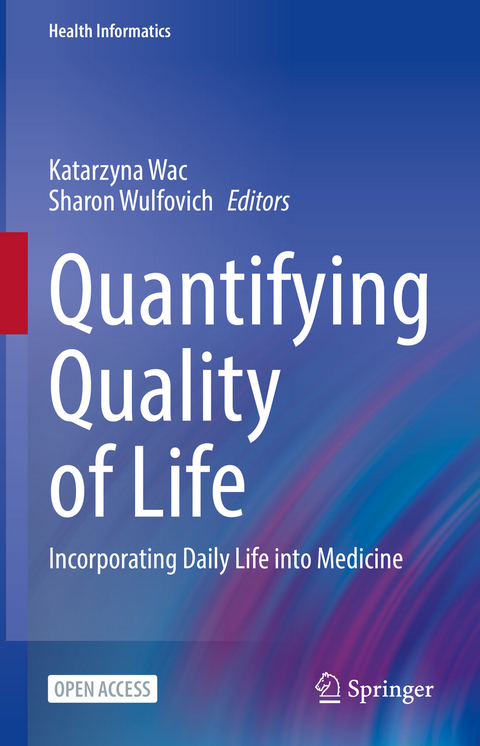
Quantifying Quality of Life
Springer International Publishing (Verlag)
978-3-030-94211-3 (ISBN)
This open access book presents the rise of technology-enabled methods and tools for objective, quantitative assessment of Quality of Life (QoL), while following the WHOQOL model. It is an in-depth resource describing and examining state-of-the-art, minimally obtrusive, ubiquitous technologies. Highlighting the required factors for adoption and scaling of technology-enabled methods and tools for QoL assessment, it also describes how these technologies can be leveraged for behavior change, disease prevention, health management and long-term QoL enhancement in populations at large.
Quantifying Quality of Life: Incorporating Daily Life into Medicine fills a gap in the field of QoL by providing assessment methods, techniques and tools. These assessments differ from the current methods that are now mostly infrequent, subjective, qualitative, memory-based, context-poor and sparse. Therefore, it is an ideal resource for physicians, physicians in training, software and hardware developers, computer scientists, data scientists, behavioural scientists, entrepreneurs, healthcare leaders and administrators who are seeking an up-to-date resource on this subject.
lt;p>Katarzyna Wac, PhD, is since 2020 a Full Professor of Computer Science at the University of Geneva (CH), as well as Invited Professor of Human-Centred Computing at the Department of Computer Science (DIKU), University of Copenhagen (DK). She was affiliated with Stanford University and Medical Centre between 2013-2020. She leads the Quality of Life (QoL) Technologies lab at the University of Geneva. Her research leverages new emerging mixed models at the interface between the computer and social sciences incorporating examination, diagnosis and treatment of daily life as an "organ" - much like a cardiologist examines heart - and the resulting Quality of Life as a "vital sign" - routinely reported for patients and non-patients alike. Her research appears in more than 150 peer-reviewed proceedings and journals in computer science, human-computer interaction and health informatics, and in 2018 she co-edited a book on Digital Health. She is a (co)-PI in several European (including H2020, Horizon Europe), Swiss National Science Foundation projects and Stanford Medicine projects. She contributes to the ITU European Regional Initiative for mHealth. In 2015 she was a TEDMED Research Scholar. Since 2017, she is an Associate Technical Editor of IEEE Communications Magazine. She is also a Senior Member of ACM and as well as of IEEE. She as well advises industry, and, as her research attracted considerable attention nationally and internationally, she is regularly interviewed in the mass media. More details at qualityoflifetechnologies.org.
Sharon Wulfovich is a current medical student at UC San Diego School of Medicine (class of 2022). She graduated from Stanford University in 2017 with a bachelor's degree in Human Biology. Sharon has been involved in the digital health field for many years. She worked as a Digital Health Fellow at the Stanford Department of Surgery and co-created the first telemedicine class at Stanford University entitled "Close Encounters, Distance Learning by Telemedicine". Additionally, Sharon has published multiple papers in the digital health field and is one of the co-editors of the book Digital Health Entrepreneurship. Her research is primarily focused on telemedicine, digital health, health innovation and entrepreneurship.
Introduction to Quality of Life and WHOQOL model.- Physical health: Activities of daily living.- Physical health: Dependence on medicinal substances and medical.- Physical health: Energy and Fatigue.- Physical health: Mobility.- Physical health: pain and discomfort.- Physical health: sleep and rest.- Physical health: work capacity.- Psychological: bodily image and appearance.- Psychological: negative and positive feelings.- Psychological: self-esteem.- Psychological: spirituality/religion/personal beliefs.- Psychological: thinking, learning, memory and concentration.- Social relationships: personal relationships +social support.- Social relationships: sexual activity.- Environment: financial resources .- Environment: freedom, physical safety and security.- Environment: health and social care: accessibility and quality.- Environment: home environment.- Environment: opportunities for acquiring new information and skills.- Environment: participation in and opportunities for recreation/leisure activities.- Environment: physical environment (pollution, noise, traffic, climate).- Environment: Transport.- Future directions.
| Erscheinungsdatum | 15.04.2022 |
|---|---|
| Reihe/Serie | Health Informatics |
| Zusatzinfo | XV, 602 p. 101 illus., 91 illus. in color. |
| Verlagsort | Cham |
| Sprache | englisch |
| Maße | 155 x 235 mm |
| Gewicht | 1085 g |
| Themenwelt | Informatik ► Weitere Themen ► Bioinformatik |
| Studium ► Querschnittsbereiche ► Prävention / Gesundheitsförderung | |
| Technik ► Medizintechnik | |
| Schlagworte | Behaviour Informatics • Mobility • open access • Physical Environment • quality of life • self-esteem |
| ISBN-10 | 3-030-94211-2 / 3030942112 |
| ISBN-13 | 978-3-030-94211-3 / 9783030942113 |
| Zustand | Neuware |
| Informationen gemäß Produktsicherheitsverordnung (GPSR) | |
| Haben Sie eine Frage zum Produkt? |
aus dem Bereich


